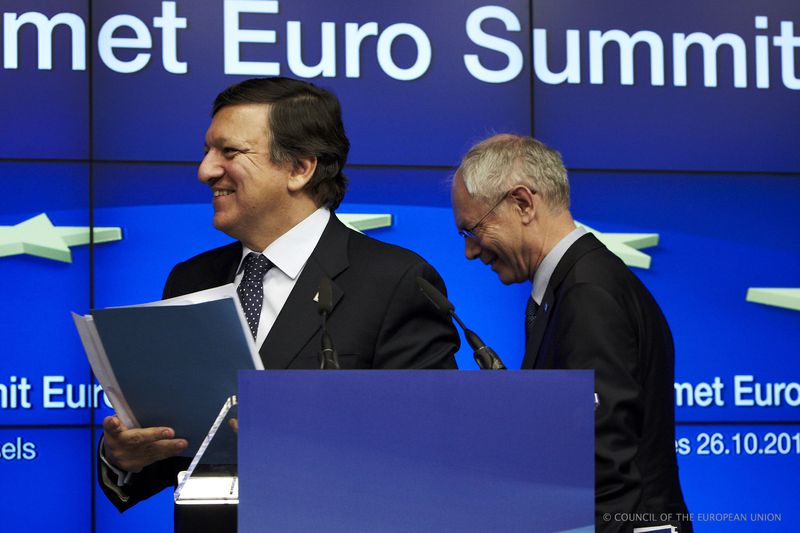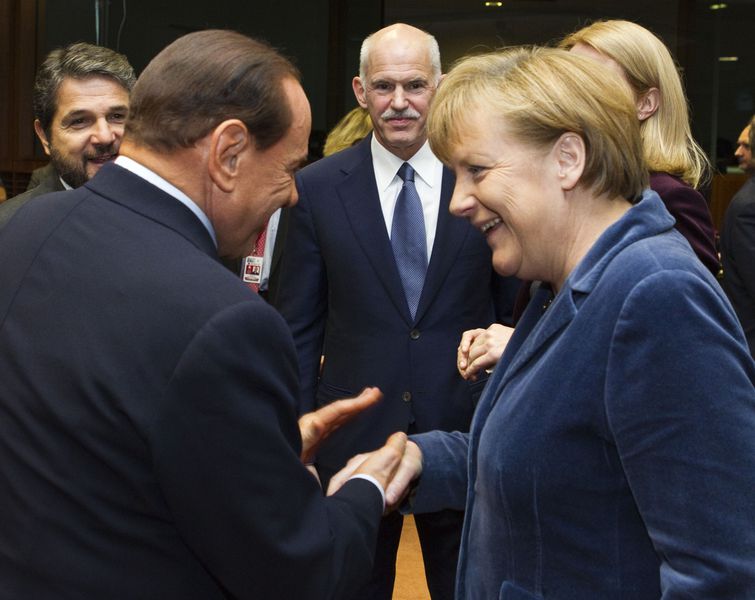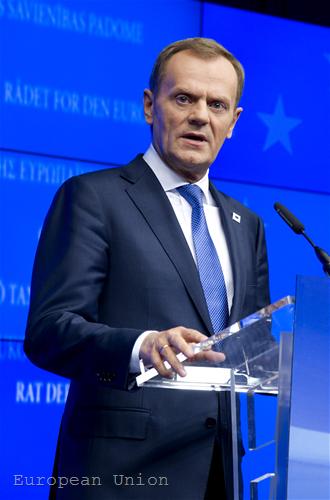Solutions but Not Quite
Ralitsa Kovacheva, October 21, 2011
 On Sunday, the EU leaders will most likely give principled answers to the urgent issues but there will hardly be a complete clarity. This is the feeling in the lobby of the Council on the eve of the European Council and the Eurozone Summit.
On Sunday, the EU leaders will most likely give principled answers to the urgent issues but there will hardly be a complete clarity. This is the feeling in the lobby of the Council on the eve of the European Council and the Eurozone Summit.
The leaders are expected to finally provide clear and definitive answers to several questions: Will Greece get the sixth disbursement of its bailout loan? What will be the private sector's involvement in restructuring the Greek debt? How exactly the rescue fund EFSF will be leveraged (that means it will have more money without increasing its capital)? How exactly the European banks will be recapitalised?
The reason these questions not to be given precise answers is that the Troika report on Greece came too late, just days before the Council, and on this namely depend the specific numbers which have to be agreed. The report recommends the next tranche of the loan to be granted to Greece but its assessment of the condition of the Greek debt and the economic forecasts are alarming. In this light, there are ongoing talks about what losses should be borne by the private sector in restructuring the Greek debt. The initially agreed 21% have to be readjusted according to the numbers in the Troika report. In the same context discussions continue on the recapitalisation of banks and the EFSF leverage.
So most likely the leaders will achieve a broad agreement on major issues but the technical details will be coordinated in the coming days by the finance ministers. This provoked a fellow journalist to ask whether there would be a new summit soon and an official European representative responded: "Is there life after death?"
According to The Financial Times, however, there will most likely be a new summit of eurozone leaders on Wednesday, due to the delayed report of the Troika, but mainly because German Chancellor Angela Merkel does not have enough time to obtain support from the Bundestag to increase rescue fund firepower. A bad sign is that Angela Merkel has cancelled her speech in the Bundestag scheduled for today (October 21). The good news is that, according to sources from the Council, differences between Germany and France in terms of the use of the rescue fund are exaggerated. Angela Merkel and Nicolas Sarkozy met in Frankfurt together with ECB President Jean-Claude Trichet, his successor in office Mario Draghi and IMF Managing Director Christine Lagarde, The Financial Times reported. France is still insisting the EFSF to be turned into a bank, backed by the ECB, while the ECB itself and Germany oppose.
What is certain is that the European Council on October 23 will discuss how economic growth to be achieved in Europe, as well as the recapitalisation of banks. European Council President Herman Van Rompuy will inform the 27 leaders on his proposals about eurozone governance because, as explained by the Council, it directly affects the interests of all member states. The model of governance will be threefold. At the highest level the leaders of the member states will meet twice a year and meetings will be chaired by Herman Van Rompuy.
The second level is the so called Eurogroup, consistent of the eurozone finance ministers, chaired by Luxembourg Prime Minister Jean-Claude Juncker. The third level is the so called Eurogroup Working Group which must be reinforced and will probably be headed by Vittorio Grilli, head of the Italian Treasury. Representatives of the Council explained that they wanted the European Commission to be prominently presented on each of the three levels of the euro area governance.
As to the treaty changes, European Council President Herman Van Rompuy is cautious. He prefers to wait until it is clear what is the aim of those who are suggesting the changes and only then to discuss what legal means to be used to achieve these goals. About the need for treaty changes spoke both some member states (Germany, the Netherlands) and European Commission President Jose Manuel Barroso.
euinside is closely following the situation in Brussels on the eve of the EU leaders meetings and will continue to inform you about everything interesting here in the coming days.
 | © The Council of the European Union
| © The Council of the European Union | © The Council of the European Union
| © The Council of the European Union | © European Union
| © European Union Klaus Regling | © Council of the EU
Klaus Regling | © Council of the EU Mario Centeno | © Council of the EU
Mario Centeno | © Council of the EU Mario Centeno | © Council of the EU
Mario Centeno | © Council of the EU